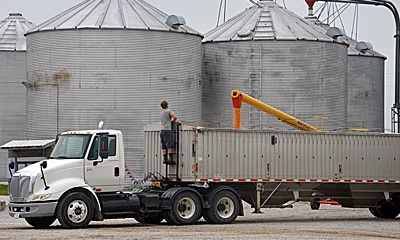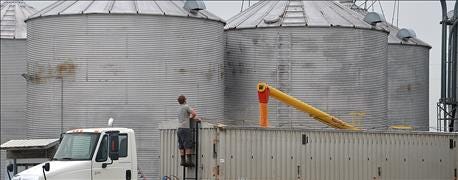
You’ve emptied your grain bins, so you’re ready for the new crop, right? Unless you’ve completed several detailed steps to get ready for new grain, the answer likely is no. You may be setting yourself up for problems the next time you are ready to haul new grain out of the bin.
Gary Woodruff is GSI conditioning applications manager. Here is a question-and-answer session between him and Indiana Prairie Farmer concerning getting empty bins ready for the next round of grain.
IPF: How should you prepare bins before filling if you’re going to store grain for six months or longer?

GET READY FOR NEW CROP: There is more to getting a bin ready for the next crop than just emptying it out, especially if you want to store for an extended period.
Woodruff: No matter how long the storage period, the preparation should be the same, since not getting rid of insects, old grain and mold that affect grain quality and storage life start affecting new grain immediately.
IPF: Where do you start with preparation of a bin?
Woodruff: All surfaces that contact the grain and the reachable aeration areas, such as the fan and transition, should be brushed or vacuumed to remove infested grain and debris. It helps to use optional plenum doors opposite of the fans to allow the area under the aeration floor to be blown clean. This should happen once each year with high-velocity air from the fans immediately after the bin is full. Bins that did not get this annual cleaning should be checked and the floor taken up to clean under the floor if debris has accumulated. The debris harbors those things that cause grain to go out of condition.
IPF: What should you do next?
Woodruff: After a thorough cleaning, the bin walls and floors should be sprayed with an approved insecticide. The outer walls and an area 15 feet from the bin should also be sprayed. It’s important to keep the bin site clean and free of weeds and tall grass to help keep insects and other varmints out of the bin.
IPF: If you have a bin empty now, should you clean it or wait closer to harvest?
Woodruff: The quicker the bin is thoroughly cleaned, the better. Then check for debris again in the fall, along with the recommended insect prevention spraying.
IPF: Are insects typically an issue in long-term storage, or are you mostly concerned about mold?
Woodruff: The best practice is to be concerned about both, though we usually see mold more than insects due to storage moisture being too high for the storage period. Insects increase the chances of mold infestations by penetrating the protection shell on the grain. That process also reduces aeration airflow with the fines that are created. So both insects and molds should be considered as significant threats.
About the Author(s)
You May Also Like




